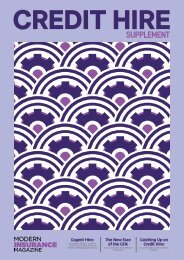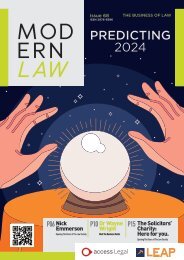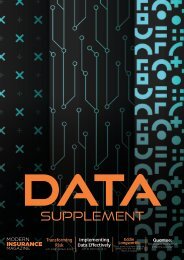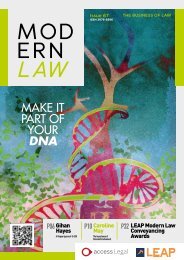Modern Law Magazine Issue 65
Interview: ‘Looking to the Future’, Eric Hunter. Interview: ‘Innovation Through Collaboration’, Electra Japonas. Interview: ‘The Intersection of A.I. and Law’, Raymond Sun. A Chat With… Ethan French, Iceberg. A Chat With… Peter Ross, Report Factory Insight: ‘Embracing Technology’, Savvas Skordellis, Deloitte. Insight: ‘Can We SustAIn It?’, Mercy Chirau, Womble Bond Dickson. Insight: ‘Collaborating On a Global Level’, Claudio Palmeri, PEXA. Insight: ‘Revolutionising the Legal Landscape’, Natasha Lewis, Duncan Lewis and YAO. Editorial Board of industry experts and thought leaders Feature: ‘From Memes to Hashtags: Why Lawyers Should Be Embracing Social Media’, Charlotte Lord. Feature: ‘Technology to Drive Sales for Law Firms’, Hannah Ajikawo. Feature: ‘LegalTech, Pricing Pressure and Emerging Technologies’, Lauren Watson Private Client Awards Personal Injury Roundtable Conference: Bold Legal Summer Conference 2023 Conveyancing Forum 10 Mins With… Hannah Ford.
Interview: ‘Looking to the Future’, Eric Hunter.
Interview: ‘Innovation Through Collaboration’, Electra Japonas.
Interview: ‘The Intersection of A.I. and Law’, Raymond Sun.
A Chat With… Ethan French, Iceberg.
A Chat With… Peter Ross, Report Factory
Insight: ‘Embracing Technology’, Savvas Skordellis, Deloitte.
Insight: ‘Can We SustAIn It?’, Mercy Chirau, Womble Bond Dickson.
Insight: ‘Collaborating On a Global Level’, Claudio Palmeri, PEXA.
Insight: ‘Revolutionising the Legal Landscape’, Natasha Lewis, Duncan Lewis and YAO.
Editorial Board of industry experts and thought leaders
Feature: ‘From Memes to Hashtags: Why Lawyers Should Be Embracing Social Media’, Charlotte Lord.
Feature: ‘Technology to Drive Sales for Law Firms’, Hannah Ajikawo.
Feature: ‘LegalTech, Pricing Pressure and Emerging Technologies’, Lauren Watson
Private Client Awards
Personal Injury Roundtable
Conference: Bold Legal Summer Conference 2023
Conveyancing Forum
10 Mins With… Hannah Ford.
Create successful ePaper yourself
Turn your PDF publications into a flip-book with our unique Google optimized e-Paper software.
INSIGHT<br />
INSIGHT<br />
Collaboration on a global scale - how PEXA<br />
harnesses technology to work better together<br />
PEXA started its journey over<br />
10 years ago with the goal<br />
of transforming property<br />
experiences for everyone. What<br />
began as a small Australian start<br />
up is now critical infrastructure<br />
for Australia’s largest asset class<br />
– residential property.<br />
Following its success in Australia, PEXA<br />
set its sights on the UK – with the<br />
target of introducing a world first<br />
digital solution for property that<br />
would save consumers time, money<br />
and ease the stress of buying or<br />
selling their home.<br />
The UK was a rational new market<br />
to explore, given the likeness in land<br />
title systems. PEXA recognised a gap<br />
in the UK remortgaging market and<br />
saw an opportunity to better leverage<br />
digital technology to enhance the<br />
efficiency, transparency, and speed<br />
of property transactions, ultimately<br />
driving a better experience for<br />
consumers transacting property.<br />
Expanding into a new market required<br />
a local team to be recruited and set up<br />
for success. This was the first time PEXA<br />
expanded operations outside Australia,<br />
and we needed to ensure our teams on<br />
both sides of the globe were working<br />
together effectively, supported by the<br />
right technology.<br />
As result of the pandemic, hybrid and<br />
remote work have become the norm.<br />
Businesses of all sizes are increasingly<br />
working with employees across different<br />
time zones, and this can amplify the<br />
challenges facing organisations. While<br />
global teams offer a range of benefits,<br />
effective collaboration in a global context<br />
requires time and effort. At PEXA, we<br />
recognise that while our approach is<br />
constantly evolving, we have found some<br />
key learnings that work for our teams.<br />
Clearly communicate goals and<br />
expectations<br />
Communication is essential at all levels,<br />
especially when setting objectives,<br />
expectations, and timelines. Working<br />
with teams globally can lead to<br />
miscommunication at times, particularly<br />
regarding priorities and workloads –<br />
after all, we can’t get in a room with a<br />
whiteboard to resolve things how we once<br />
were able. Fortunately, there are many<br />
technology solutions available to facilitate<br />
communication across every stage of the<br />
project. Tools such as Slack and MS Teams<br />
for instant messaging, fully-fledged<br />
project management platforms like Trello<br />
and Jira make it possible for teams to<br />
collaborate effectively.<br />
Embrace asynchronous work and<br />
asynchronous decision making<br />
When a business has distributed teams<br />
there will always be people working at<br />
different hours, and in different time<br />
zones. Asynchronous collaboration<br />
allows projects and deliverables to move<br />
forward without the requirement for<br />
team members to work very early in the<br />
morning, or late at night. There are many<br />
tools that support asynchronous work<br />
including audio and video recordings<br />
(our teams often record a quick update<br />
message to their overseas colleagues<br />
before logging off each evening) as well<br />
as digital whiteboarding tools like Miro.<br />
Additionally, we remind ourselves that<br />
not all decisions require a meeting, some<br />
business-critical decisions can be made<br />
with an email or using instant messaging.<br />
Establish a schedule that works for<br />
the whole team<br />
While asynchronous work is best for global<br />
teams, there are times when meeting<br />
in real time can add value or be more<br />
efficient. Businesses need to think about<br />
how employees can manage their days in<br />
these circumstances so they’re not working<br />
around the clock. This can be done by<br />
implementing staggered start and finish<br />
times or allowing employees to take extra<br />
breaks during the day. We’ve agreed on<br />
a framework of ‘golden hours’, where we<br />
agree to collaborate during a time window<br />
that works for everybody. Teams should<br />
also avoid scheduling meetings without an<br />
agenda and without a clear objective, it is<br />
inefficient to have employees attending<br />
an after-hours meeting with no concrete<br />
actions or outcomes.<br />
Strong cyber security culture<br />
and awareness<br />
Cyber security has always been critical<br />
for businesses, however hybrid and<br />
global teams have increased the number<br />
of security risks. Some basic cyber<br />
security awareness and hygiene can<br />
go a long way to protect you and your<br />
business. This includes ensuring your<br />
operating system and antivirus software<br />
is up to date and using long and complex<br />
passwords to access business systems.<br />
Where possible, use a password manager<br />
and multi-factor authentication and<br />
always be careful when an email has an<br />
attachment, or a link embedded. Even<br />
if the sender seems familiar, always<br />
double-check before clicking on the<br />
attachment or link. And remember that<br />
security should never hinder people’s<br />
productivity and global collaboration.<br />
Make resources available to<br />
all members<br />
To ensure effective and efficient global<br />
collaboration, it is important that all<br />
team members have access to the<br />
same resources to collaborate. It would<br />
be futile to capture important project<br />
details on a software application that<br />
is only accessible by a handful of<br />
people. Platforms like Confluence and<br />
SharePoint are a great way to make sure<br />
all team members are on the same page.<br />
Build trust and create connections<br />
Successful collaboration is reliant on<br />
building a foundation of trust with our<br />
teams. Recognising that before being<br />
colleagues, we are all people with<br />
different personal circumstances and<br />
experiences. Ensuring that you take<br />
time to get to know your team, their<br />
interests, goals and challenges helps<br />
to build a sense of connection while<br />
being cognisant of different cultures.<br />
Supporting diversity is key for effective<br />
collaboration, especially when working<br />
with global teams.<br />
Whether you have one employee abroad,<br />
a whole team, or another business entirely<br />
– it can seem like a lot to think about and<br />
manage. Establishing ways of working<br />
globally was something we carefully<br />
considered before taking the leap. While<br />
the experience of consumers buying<br />
and selling in the UK has some room for<br />
improvement, the prospect of working<br />
with the industry to help was something<br />
we couldn’t pass up. The opportunity<br />
to succeed in the UK market made<br />
the challenges of standing up a global<br />
operation seem small.<br />
Claudio Palmeri,<br />
Head of Application<br />
Services, PEXA<br />
Revolutionising<br />
the Legal Tech Landscape<br />
I started my own law firm from observing a significant gender disparity in female equity<br />
partners when I was studying law. I decided to start my own law firm and become an<br />
equity partner as I didn’t see many women like me when I started by career. Running<br />
my own law firm can be very challenging and I encountered various challenges relating<br />
to software solutions available in the market. The existing options were often expensive,<br />
lacked customisation and failed to cater for our diverse needs of legal professionals. This<br />
limitation hindered productivity and innovation within the legal industry.<br />
Frustrated by the limitations of<br />
existing software, I recognised an<br />
opportunity to make a difference. I<br />
decided to take matters into my own<br />
hands and embark on a journey to<br />
develop YAO, a legal tech platform<br />
tailored specifically for lawyers.<br />
YAO represents my commitment to<br />
revolutionise the legal tech landscape<br />
by addressing the shortcomings of<br />
the existing solutions and providing a<br />
platform that truly meets the needs of<br />
legal professionals. The tech industry<br />
is often dominated by Men however<br />
I found that combining law with the<br />
potential of technology I aimed not<br />
only to establish a successful law firm<br />
but also address the specific needs<br />
of legal professionals through the<br />
development of a legal tech platform.<br />
A Platform for <strong>Law</strong>yers, by <strong>Law</strong>yers: YAO<br />
stands out from the crowd because it<br />
is built by lawyers who understand the<br />
intricate requirements and workflows<br />
of the legal profession. This firsthand<br />
experience allows us to develop a<br />
platform that is intuitive, user-friendly,<br />
and aligned with the unique needs<br />
of legal professionals. From case<br />
management to document automation,<br />
YAO provides a comprehensive suite of<br />
tools that streamline legal processes,<br />
enhance collaboration, and increase<br />
productivity. Recognising that each<br />
law firm operates differently, YAO<br />
offers a high degree of customization<br />
and flexibility. Our platform allows<br />
legal professionals to tailor it to their<br />
specific practice areas, workflows, and<br />
preferences. By empowering lawyers<br />
to personalize their experience, YAO<br />
eliminates the need for generic and rigid<br />
solutions that fail to cater to the diversity<br />
of the legal industry.<br />
YAO understands the financial<br />
constraints that many law firms face.<br />
We believe that technology should<br />
not be a barrier to entry or hinder<br />
the growth of legal professionals.<br />
Therefore, we have designed YAO with<br />
affordability and accessibility in mind.<br />
Our flexible pricing structure ensures<br />
that firms of all sizes can access and<br />
leverage the power of YAO, empowering<br />
them to compete in an increasingly<br />
digitalised legal landscape.<br />
Embracing Technology for Growth: By<br />
embarking on the tech sector, YAO<br />
represents a commitment to embrace<br />
technology for the betterment of<br />
the legal profession. We believe<br />
that technology has the power to<br />
revolutionise legal processes, improve<br />
efficiency, and enable lawyers to<br />
provide better services to their clients.<br />
YAO empowers legal professionals<br />
to stay ahead of the curve, adapt to<br />
changing industry demands, and thrive<br />
in an ever-evolving digital age.<br />
By developing YAO, I aim to bridge the<br />
gap between lawyers and technology,<br />
providing an intuitive, customisable,<br />
and affordable solution that empowers<br />
legal professionals to streamline their<br />
processes and excel in their practice.<br />
YAO represents my commitment to<br />
advancing the legal industry through<br />
technology and serves as a catalyst for<br />
positive change within the profession.<br />
Together, we can embrace the digital<br />
transformation and shape a brighter<br />
future for legal professionals worldwide.<br />
Natasha Lewis,<br />
Managing Partner<br />
& Founder,<br />
Lewis Denley<br />
& Yao.<br />
22
















